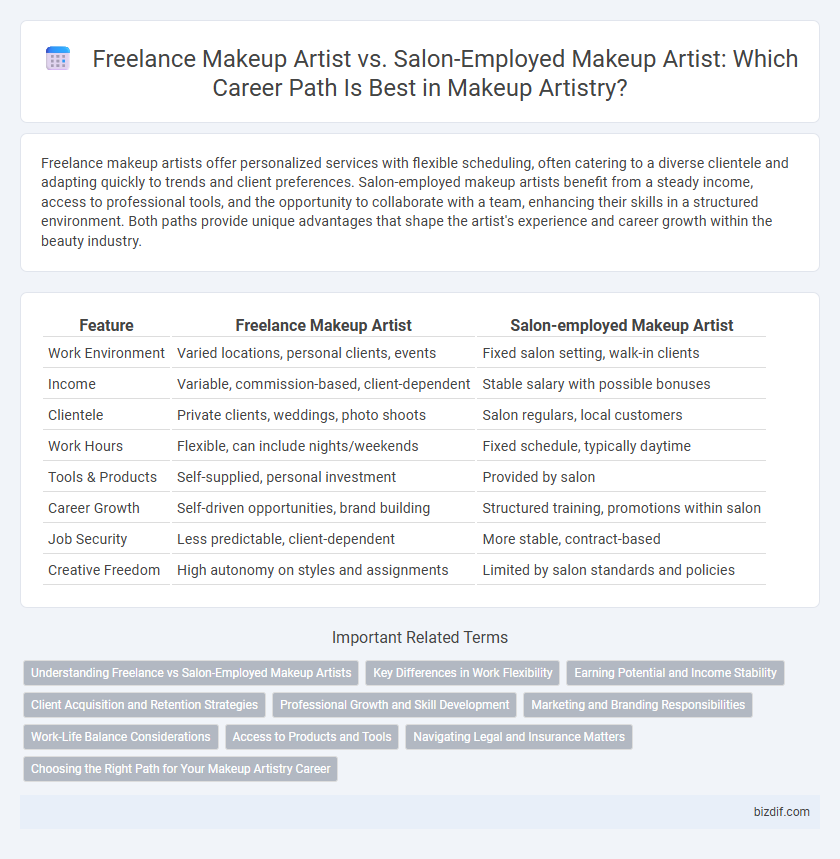Freelance makeup artists offer personalized services with flexible scheduling, often catering to a diverse clientele and adapting quickly to trends and client preferences. Salon-employed makeup artists benefit from a steady income, access to professional tools, and the opportunity to collaborate with a team, enhancing their skills in a structured environment. Both paths provide unique advantages that shape the artist's experience and career growth within the beauty industry.
Table of Comparison
| Feature | Freelance Makeup Artist | Salon-employed Makeup Artist |
|---|---|---|
| Work Environment | Varied locations, personal clients, events | Fixed salon setting, walk-in clients |
| Income | Variable, commission-based, client-dependent | Stable salary with possible bonuses |
| Clientele | Private clients, weddings, photo shoots | Salon regulars, local customers |
| Work Hours | Flexible, can include nights/weekends | Fixed schedule, typically daytime |
| Tools & Products | Self-supplied, personal investment | Provided by salon |
| Career Growth | Self-driven opportunities, brand building | Structured training, promotions within salon |
| Job Security | Less predictable, client-dependent | More stable, contract-based |
| Creative Freedom | High autonomy on styles and assignments | Limited by salon standards and policies |
Understanding Freelance vs Salon-Employed Makeup Artists
Freelance makeup artists offer personalized services with flexible scheduling and diverse client experiences, often building their own brand through social media and word-of-mouth. Salon-employed makeup artists benefit from steady income, access to professional-grade tools, and ongoing training opportunities within an established beauty business. Understanding these differences helps clients choose the best option based on budget, service customization, and reliability.
Key Differences in Work Flexibility
Freelance makeup artists enjoy greater work flexibility by choosing their own clients, setting schedules, and selecting diverse projects, often leading to varied income streams and creative freedom. Salon-employed makeup artists typically adhere to fixed hours, follow salon protocols, and benefit from a steady paycheck, but have less control over their daily work environment. The choice between freelance and salon employment significantly impacts a makeup artist's autonomy, income variability, and ability to balance personal and professional commitments.
Earning Potential and Income Stability
Freelance makeup artists often experience fluctuating income dependent on client bookings, seasonal demand, and personal marketing efforts, which can lead to higher earning potential during peak periods. Salon-employed makeup artists benefit from stable salaries or hourly wages, providing consistent income and benefits but potentially limiting earnings due to fixed pay structures. Freelancers can scale income through diverse gigs, private events, and brand collaborations, whereas salon employees rely on commissions and tips, impacting overall financial growth.
Client Acquisition and Retention Strategies
Freelance makeup artists leverage personalized social media marketing and networking at events to acquire clients, emphasizing unique style and flexibility to build loyal followings. Salon-employed makeup artists benefit from the salon's established client base and rely on consistent service quality and in-house promotions to retain clients. Both use portfolio showcases and client testimonials, but freelancers often focus more heavily on digital branding and direct client engagement to ensure retention and growth.
Professional Growth and Skill Development
Freelance makeup artists often experience accelerated professional growth and skill development by working with diverse clients and adapting to various styles and demands, which enhances creativity and versatility. Salon-employed makeup artists benefit from structured training programs and mentorship, gaining consistent access to industry techniques and product knowledge within a collaborative environment. Both career paths offer unique opportunities for mastery, but freelancers may advance faster through exposure to a broader range of projects and networking prospects.
Marketing and Branding Responsibilities
Freelance makeup artists shoulder the full spectrum of marketing and branding responsibilities, including social media management, client acquisition, and portfolio development, to build a distinct personal brand. Salon-employed makeup artists benefit from the salon's established marketing infrastructure, gaining visibility through the salon's reputation and promotional efforts but often with limited control over personal brand identity. Effective self-promotion and consistent brand messaging are critical for freelancers to compete and secure clients independently in the competitive makeup artistry market.
Work-Life Balance Considerations
Freelance makeup artists experience flexible scheduling that allows better control over personal time, often leading to improved work-life balance compared to salon-employed counterparts. Salon-employed makeup artists face fixed hours and client bookings, which can result in less flexibility but greater job stability and consistent income. Choosing between freelance and salon employment depends on individual priorities regarding autonomy, income consistency, and lifestyle preferences.
Access to Products and Tools
Freelance makeup artists have the advantage of selecting and investing in a personalized range of high-end products and professional tools tailored to diverse client needs, enabling greater creative flexibility. Salon-employed makeup artists typically have access to a curated inventory of branded products and salon-exclusive tools, ensuring consistent quality but limited customization options. Access to professional-grade materials directly influences the efficiency, style adaptability, and overall service quality of makeup artists in both settings.
Navigating Legal and Insurance Matters
Freelance makeup artists must independently secure liability insurance and understand contract law to protect against client disputes and service-related risks. Salon-employed makeup artists benefit from the salon's insurance coverage and legal support, reducing personal financial exposure in case of accidents or complaints. Awareness of local licensing requirements and liability policies is essential for both to ensure compliance and secure professional practice.
Choosing the Right Path for Your Makeup Artistry Career
Freelance makeup artists enjoy flexible schedules and diverse client opportunities, allowing creative freedom and personalized branding, but face challenges in self-promotion and income stability. Salon-employed makeup artists benefit from steady income, access to salon clientele, and professional collaboration, but may encounter limited creative control and fixed working hours. Selecting the right path depends on career goals, risk tolerance, and desire for independence within the makeup artistry industry.
Freelance Makeup Artist vs Salon-employed Makeup Artist Infographic

 bizdif.com
bizdif.com